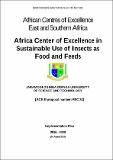| dc.contributor.author | ACEII | |
| dc.date.accessioned | 2020-02-14T08:05:40Z | |
| dc.date.available | 2020-02-14T08:05:40Z | |
| dc.date.issued | 2016-08-09 | |
| dc.identifier.uri | http://hdl.handle.net/11671/2055 | |
| dc.description | Jaramogi Oginga Odinga University of Science and Technology (JOOUST) is a public chartered
academic and research institution in Kenya and has been pioneering research in insect science
and technology for food and feed in Western Kenya. The University working in collaboration
with regional and international institutions has initiated rearing and value addition of insects for
food and feed. | |
| dc.description | Through ACE II, the University in collaboration with local, regional and international partners
proposes to establish the Africa Center of Excellence in Sustainable Use of Insects as Food and
Feeds (INSEFOODS) with an overall objective to address challenges of sustainable food security
using insects for food and feed. T | |
| dc.description.abstract | Focus on motivation, objectives, methodology, results and partnerships. Must include a section on
important changes made
Malnutrition and food insecurity remain a major challenge in sub-Saharan Africa due to limited
access to proteins. Edible insects have been identified to be an inexpensive alternative source of
animal protein for human and livestock due to their nutritional value and efficiency in food
conversion. | |
| dc.language.iso | en | en_US |
| dc.publisher | ACEII | en_US |
| dc.relation.ispartofseries | ACE II proposal number;ESC 34 | |
| dc.subject | JARAMOGI OGINGA ODINGA UNIVERSITY OF SCIENCE AND TECHNOLOGY | en_US |
| dc.subject | JOOST | en_US |
| dc.title | Africa Center of Excellence in Sustainable Use of Insects as Food and Feeds: Implementation plan | en_US |

